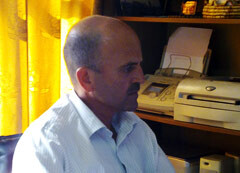The Electronic Intifada 15 November 2010

Yousef Awad
Adri Nieuwhof: Can you please introduce yourself and the Jenin Creative Cultural Center?
Yousef Awad: My name is Yousef Awad and I am the director of the Center. I finished my MA in peace and development studies in Sweden. I was very active in the International Solidarity Movement (ISM); I am one of the founders and I was the coordinator for ISM in Jenin. During the second intifada Jenin camp was heavily damaged. It was important to bring something for the safety of the children who would otherwise be out in the streets chasing the [Israeli] tanks. [We wanted] a center where children can come, practice their hobbies, enjoy things and find safety inside. That is why we decided to open the center.
AN: Can you describe the situation of the children in Jenin?
YA: Now since the Palestinian Authority returned to Jenin, they managed to maintain control of the situation. It is now better than four years ago. With the absence of the Israeli incursions it is not like before. It is safer. I am not saying that it is stable, secure; no — suddenly it can change. Life is still under abnormal conditions; there is an occupation which causes instability. We wish that our Palestinian children have the same standard of life as all children in the world — to live their lives and fulfill their dreams.
AN: Does the situation in Jenin differ from the situation in Gaza?
YA: Yes, of course. It is not comparable, the West Bank and Gaza. The people in Gaza have been living under siege for three years. They have no access to the outside world. They cannot practice their normal daily lives. But in a way it is the same here [in the West Bank], in East Jerusalem, Silwan and the villages around Nablus, where we have atrocities and hostile actions from the [Israeli] settlers.
AN: What activities are offered to the children by the center?
YA: We try to find activities that make their lives more normal, that bring amusement, enjoyment. We do puppet shows. We do dance, music or paint projects with the children. We reach out to villages near the apartheid wall and to schools. We want to get in touch with as many children as possible. In some schools we reach about 700 children. We even did a medical check-up as an activity, an eye check-up, and provide the children with glasses if necessary. In the painting and story-telling workshops children can express their feelings. We want to give them the experience that they have something good in their lives. And that they can find a way to do something good.
AN: Can you tell us about the major concerns of parents and teachers for the future of the children here?
YA: The main concern of all Palestinians is to have their rights, to have an independent state and peace. Parents think about the future of their children, but everything is related to the political situation. It influences all aspects of life, that of the farmers, the teachers, the parents, the children. How can you think of the future when there are no jobs? In the public sector, people fear for their salaries. How can you teach when you are concerned if you will have a salary next month?
If the political situation is promising, if the conflict is solved, the children, the teachers, the people will have a good future. Right now the whole community is afraid of how things will go.
AN: How do children look upon their future? What are their dreams?
YA: I can tell you from my experience that children want to have a good future. Maybe other children do not think about this. They take the future for granted. The children here think about if they can finish their education. Can their parents pay? You can have high grades, but can you continue your studies? When you sit with the children they will tell you that they dream of seeing the sea. We are maybe a twenty-minute drive away from the sea, but we are not allowed to go there. Children dream of their freedom of movement. They want to go to Jerusalem, Nazareth, Haifa and Acre. Some children dream of going abroad. These are very simple dreams. Actually, our center managed to achieve the dream of travel for some of the children. We visited different countries with our exhibitions, plays, music and dance productions.
I want our children to visit their relatives in Israel. To live like all children. I want them to have a picnic at the sea side.
AN: What does working for the center mean to you?
YA: I want to bring some joy to the lives of children with our activities. First of all, my dream is to have our independence to create happiness in the hearts of the children. I want to create hope, to create a safe and secure atmosphere for them. Without hope it will be hard to build a future for Palestine.
Adri Nieuwhof is a consultant and human rights advocate based in Switzerland.





